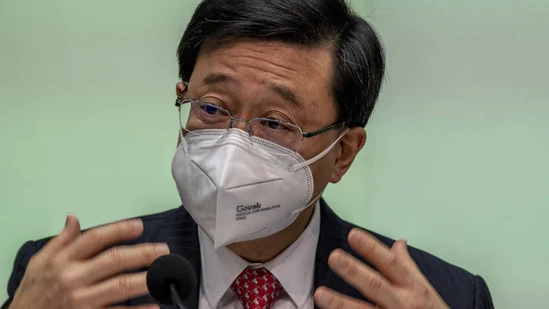
Hong Kong: John Lee has asked Beijing’s lawmakers to rule on Hong Kong’s request to bar foreign lawyers from working on national security cases.
Hong Kong leader John Lee said on Tuesday that the central government in Beijing is “deeply concerned” about the issue of foreign lawyers appearing on national security issues, and Beijing’s significant legal interpretation of the issue. expected soon. Putin’s troops withdraw from Kherson to ‘save lives’
Powered by
Lee on Monday told Beijing lawmakers to rule on Hong Kong’s request to ban foreign lawyers from working in national security cases, after the country’s highest court ruled that a British lawyer could represent a lawmaker. democracy is Jimmy Lai.
Lee told reporters on Tuesday that he expected the Chinese People’s Political Consultative Conference (NPCSC) to issue a decision on the matter “as soon as possible, ” but he did not indicate whether the decision will come before the start of Lai’s trial. on Thursday. . Lee said Hong Kong authorities are seeking to delay the start of the trial.
Hong Kong’s Ministry of Justice has repeatedly tried to block British lawyer Timothy Owen from representing Lai, one of Hong Kong’s most prominent critics of China’s communist regime, in a national security case. . Wen told Reuters he could not comment on the situation.
Hong Kong’s highest court, the Court of Final Appeal, on Monday rejected the government’s bid to bar Owen from the trial and imposed a “coverage ban” on foreign lawyers working on national security cases. But Lee argued that Beijing’s intervention, which would be only the sixth instance of Chinese lawmakers getting involved in legal issues in Hong Kong, was important in part because the lawyer from the country another may mean state secrets or foreign governments have violated it.
However, some legal experts said it would undermine public confidence in Hong Kong’s judicial independence, which has been effectively implemented since the handover of the ‘one country, two systems’ system. British rule in China in 1997. “What we have seen in the definition is basically ‘My bosses win, your tails you lose,'” Alvin Cheung, an associate professor of law at Queen’s University in Canada, told Reuters.
Cheung was part of a team that drafted a legal review in May, signed by former UK justice secretary Robert Buckland and retired Australian High Court judge Michael Kirby, which identified the NPCSC’s definition as one among the legal threats in Hong Kong. . “The NPCSC is a political (and unofficial) body whose activities are carried out behind closed doors, without the involvement of the members. Its decisions are based on politics rather than research. of the law and has little or no thought”, the letter read. Victor Dawes, head of the country’s bar association, said he hoped the NPCSC’s powers of interpretation would be used effectively, but said Hong Kong had enough authority over local bars to manage the country’s safety measures. .
“Having such a power will lead to discussion and criticism of our legal system,” said Dawes, whose association represents more than 1,600 Hong Kong lawyers. Speaking privately, criminal lawyers and five city legislators said the move was being talked about among their peers, raising concerns that it would violate the country’s constitution, which includes long using foreign lawyers to use both. lawyers and security guards.
“It’s a dark time,” said a Hong Kong criminal lawyer. “Some of us will be planning our departure soon. The message is clear.” The attorney declined to be named because of the sensitivity of the situation. Hong Kong officials, including Lee, have repeatedly said that Hong Kong firmly believes that the rule of law protects its judicial independence.


